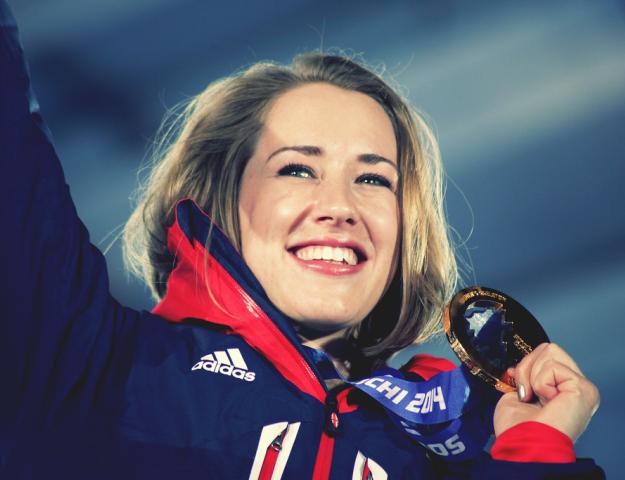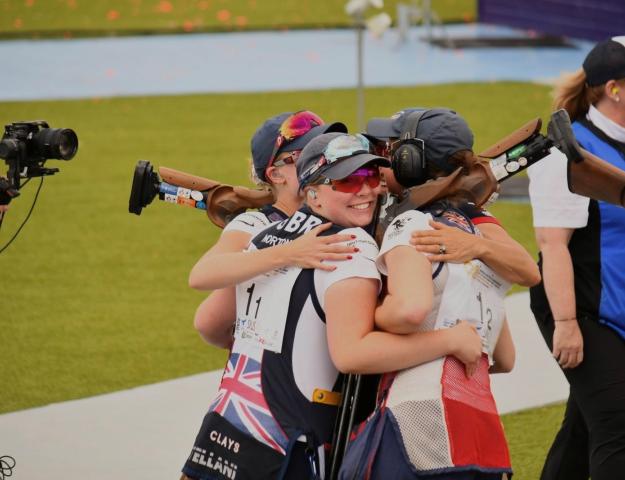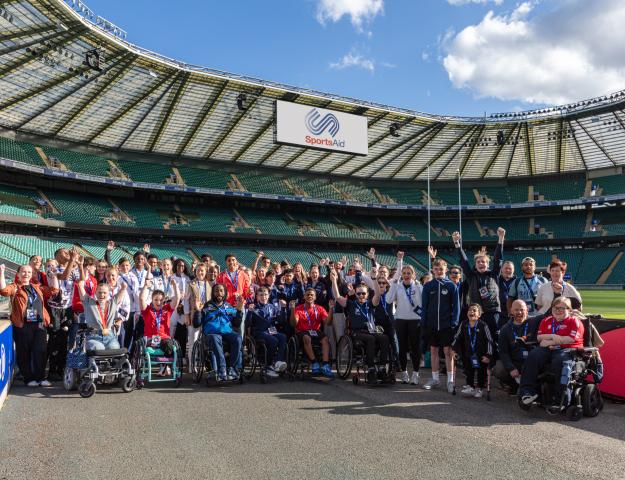- HOME
- Currently Supported
- Athlete Stories
- Inside my world: Claire Stancliffe
Claire Stancliffe
This time....it's Claire Stancliffe, 32, from Wellingborough, Northamptonshire. She is a footballer who represents the England and Great Britain deaf teams. Claire is currently supported by SportsAid having been nominated by The FA, the sport’s national governing body, this year. Her aspiration is to win an elusive gold medal at either the Deaflympics or Deaf World Cup.
Here, Claire takes you into her world as she blogs about discovering other deaf people playing football for the first time, a serious injury that almost ended her career and the high-profile backing received from current and former Premier League stars for the national team.
“My first experience of football was my mum and my dad, who are big football fans. My mum used to play when she was little, but, obviously, football for girls back then wasn't big. So, she didn't play in a team or anything. I always used to watch football with them on the TV and I used to play in the park with my friends and when I went to primary school, I was involved in the girl's football team there and I played for the boys' team as well. I just loved playing, it was something I enjoyed and the fact that I lost my hearing when I was about four and a half, it was that sort of time that I got involved in football.
“So I felt like it didn't stop me from being normal in a way it didn’t impact on how I played. Being deaf has affected my confidence a lot and I'm not a very confident person, in general, anyway. I'm quite shy, so, I think that's held me back a lot, especially when it comes to, going into hearing teams and clubs. If I need to find a new club, I'm always very hesitant to go to their training sessions and I just don't feel that people would really understand deafness. I think as I've gotten older, it doesn't affect me as much, I think I've become more aware and I'm able to cope and deal with things a lot better.
“I found it a lot more challenging when I was younger. People, like players, wouldn't understand and they would have a go at me for not doing the same thing. The referees, when I couldn’t hear them, would sometimes pull me up if I carried on playing when the whistle had gone. They would have a word with me and almost give me a yellow card. But when I tell them I'm deaf - they realise. Now I'm a lot more knowledgeable and more aware about how best to deal with it. My first experience of playing with other deaf players is when I was randomly asked to play in a deaf football tournament in Derby.
“I'd never ever met another deaf person before. I thought I was literally the only deaf person in the world which is a bit bizarre. It was just surreal going there seeing people use sign language to communicate, and just how inclusive it was. If I didn't understand something, like someone signing, there was always someone there to translate into English for me, and vice versa. I loved how everyone was so included. It was actually that tournament when the England Head Coach was there watching - I didn't realise at the time and she approached me and asked for my contact details.
“Then, I got invited to trial and from then on, I've been involved with England and GB deaf squads. I've been incredibly lucky to have been selected for every 11-a-side deaf international football tournament. Since then, I've won four bronze medals. I've gone on to captain Great Britain at three tournaments, and I also won the Sky Sports Sportswoman of the Month for July 2016. I think the biggest achievement was probably winning the bronze at the Deaf World Cup in 2016. Just because of the story behind it - it was just extra special with the amount of work we had to put in to get there.
“Back in 2009, the International Committee for Deaf sport decided that it wouldn't be England that are allowed to enter a team into the international competition – it would have to be Great Britain. Since 2009, we had been self-funded and in the initial stages, players were able to get funding through sponsorship, and family and friends, but as years went on, it was always the same players who needed that fundraising. It got more and more difficult to approach the same people. We just ran out of ideas and we had missed the 2012 World Cup because we didn't have the funding.
“I think it got to a point where from that experience, I didn't want to miss another tournament and I came up with the idea to crowdfund. That was incredible, just to have people that I've watched growing up, and still watch [the likes of Gary Neville, James Milner, Jack Butland] put some money in to help us get there – I just can't describe that feeling. I'm ever so grateful for what they did, not just those high-profile people, but members of the public that just put in a little bit of money.
“At the Deaflympics, we got to the bronze medal match, and unfortunately, a lot of the athletes had been unwell – me included – and in the first minute I had to run for the ball. The Brazil player was behind me and she just literally knocked my leg a little bit and my right leg was completely straight and wobbling just like jelly. I had no energy, my knee just caved in and out and so I ended up with a very serious knee injury. I ended up needing two operations, I needed ACL reconstruction, and then a year later they had to go back in depth because of the amount of scar tissue that I had.
“It was restricting my movement and it took me a good 18 months to get back playing football again. Anyone that's gone through an ACL injury can totally relate to what it is like, and it's just up and down. I think the mental side of it was a lot harder than the physical. It was just being able to trust your knee again. People telling you that you are never going to play again. You start to believe that as you go through the recovery process. I was very lucky to have really good support around to get me through that.
“I want to get a gold medal as I haven't done that yet – I haven't got to a final, I’m not ready to give up playing just yet, but I would love to get to a final as a player. Beyond that, I would still love to be involved in terms of the England and GB deaf squads, maybe as a staff member. My hope is to also see the Government officially recognise DeaflympicsGB and a clear performance pathway developed for deaf athletes as this could open up so many doors in terms of sponsorships and accessibility. Alongside this, I would like to see an increase in the opportunities provided for deaf people of all ages. I am proud to be a member of the UK Deaf Sport Athlete Leadership Group which was set up after the Deaflympics 2017 to allow athletes to have a voice.
“I am an athlete representative on the Leadership Group and I gather and share information to and from my specific sport to allow opinions to be heard. I feel like I thrive when given more responsibility and it’s increased my confidence with ensuring our athletes receive the best possible. We are working hard in our conversations with the DCMS to build a better future for current and up-and-coming deaf athletes. I am looking forward to more positive strides being made, and with ‘Football Your Way’, The FA’s new three-year disability plan, it’s also a promising time for disability football. It will be exciting to see how this develops over the coming years and strengthens the game.”
What will you do to #SupportTheNext generation of British sporting heroes? SportsAid needs your help to ensure talented athletes can continue receiving the backing they rely on. Find out more about how you can support the charity and have a significant impact on the country’s sporting future!




